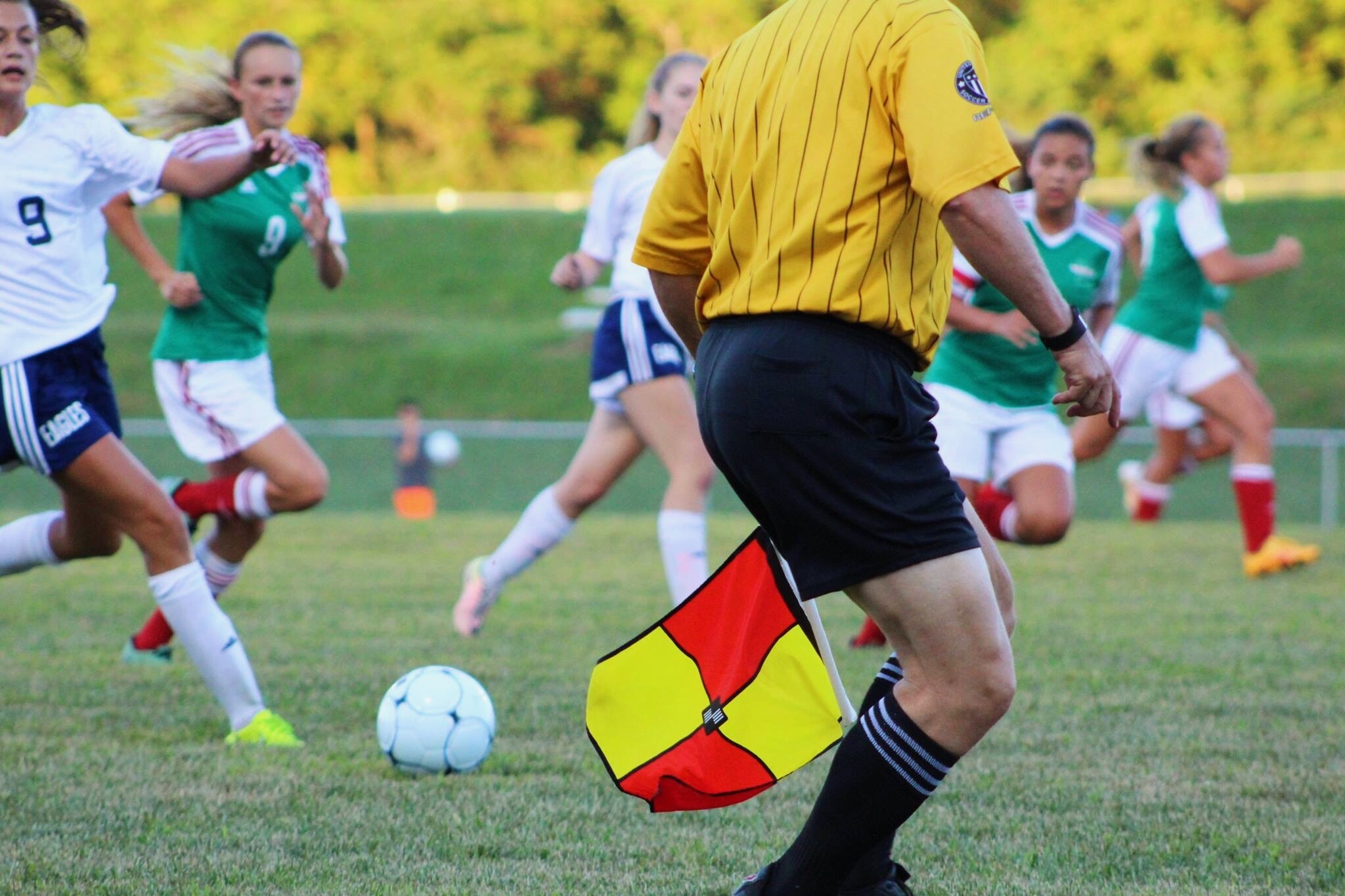So you’re curious about how soccer referees get ready for their matches? Well, preparation is key for these whistle-blowing guardians of fair play.
With the responsibility of making split-second decisions on the field, referees must equip themselves both mentally and physically to handle the intensity of the game. From studying the rulebook religiously to engaging in rigorous fitness regimes, referees invest their time and effort into ensuring they’re ready to keep the game running smoothly.
Let’s take a closer look at the meticulous methods employed by soccer referees to prepare themselves for the challenges that lie ahead.
Physical Fitness Preparation
Endurance Training
As a referee, it is important for you to have exceptional endurance. Soccer matches can be physically demanding and can last for long periods of time, so you need to ensure that you have the stamina to keep up with the players.
Endurance training is crucial for building up your cardiovascular fitness and increasing your overall stamina. This can involve activities such as running, cycling, or swimming, which will help improve your endurance levels and allow you to perform to the best of your abilities during matches.
Speed Training
In addition to endurance, speed is another important aspect of a soccer referee’s physical fitness. You need to be able to keep up with the fast-paced nature of the game and be in the right position to make accurate calls.
Speed training exercises can include sprints, agility drills, and interval training to improve your acceleration and overall speed. By incorporating speed training into your fitness routine, you will be able to confidently keep up with the players and effectively officiate the game.
Strength Training
Strength training plays a vital role in a referee’s physical preparation. It helps improve your overall muscular strength and power, allowing you to withstand the physical demands of the game. Exercises such as squats, lunges, and deadlifts can be incorporated into your strength training routine to target your lower body, which is essential for maintaining stability and balance on the field.
Additionally, upper body exercises like push-ups and overhead presses can help improve your overall strength and enable you to confidently enforce the rules of the game.
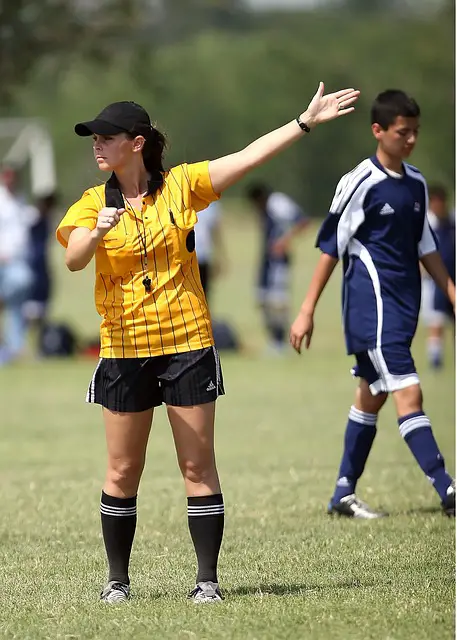
Mental Preparedness
Studying the Rules and Regulations
As a soccer referee, it is crucial to have a thorough understanding of the rules and regulations of the game. Familiarize yourself with the most recent rulebook and study the various laws of the game. This will help you make accurate decisions and enforce the rules correctly during matches.
Take the time to review any recent updates or modifications to the rules to ensure that you are up to date with any changes that may affect your officiating.
Reviewing Match Videos
Watching match videos is an excellent way to improve your decision-making skills and learn from experienced referees. Analyze the referee’s positioning, communication, and decision-making during different scenarios.
Pay close attention to how they handle confrontations or difficult situations on the field. By observing and analyzing match videos, you can gain valuable insights that will help you refine your own officiating skills and handle similar situations effectively.
Mental Visualization
Mental visualization is a technique used by many athletes to enhance their performance, and it can be particularly beneficial for referees. Take a few moments each day to visualize yourself officiating a match. Picture yourself confidently making accurate decisions, effectively communicating with players and coaching staff, and maintaining control of the game. By mentally rehearsing different scenarios and visualizing successful outcomes, you can boost your confidence and improve your overall performance on the field.
Reviewing Team and Player Information
Researching Team Tactics
To officiate a soccer match effectively, it is important to have a good understanding of the tactics employed by each team. Research and familiarize yourself with the playing style of both teams, their formations, and any specific strategies they may employ. This knowledge will enable you to make informed decisions related to offside calls, fouls, and other game situations. By understanding the tactics of the teams involved, you can position yourself better on the field and anticipate potential areas of conflict or contention.
Studying Player Profiles
Knowing the key players and their individual characteristics is essential for a referee. Review the player profiles of each team and familiarize yourself with their strengths, weaknesses, and tendencies. This information will help you recognize patterns of play, anticipate potential fouls or aggressive behavior, and enforce the rules efficiently. It is important to have a fair and impartial mindset, treating all players equally, but being aware of individual player traits can contribute to making accurate decisions.
Analyzing Previous Matches
Watching previous matches involving the teams you will be officiating can provide valuable insights into their style of play and interactions on the field. Analyze how fouls are committed, how players react to challenges, and how the teams interact with each other and the officials.
This analysis will help you understand the dynamics between the teams and anticipate potential contentious situations. By having a comprehensive understanding of their playing history, you can officiate the current match more effectively, ensuring fairness and maintaining control throughout the game.
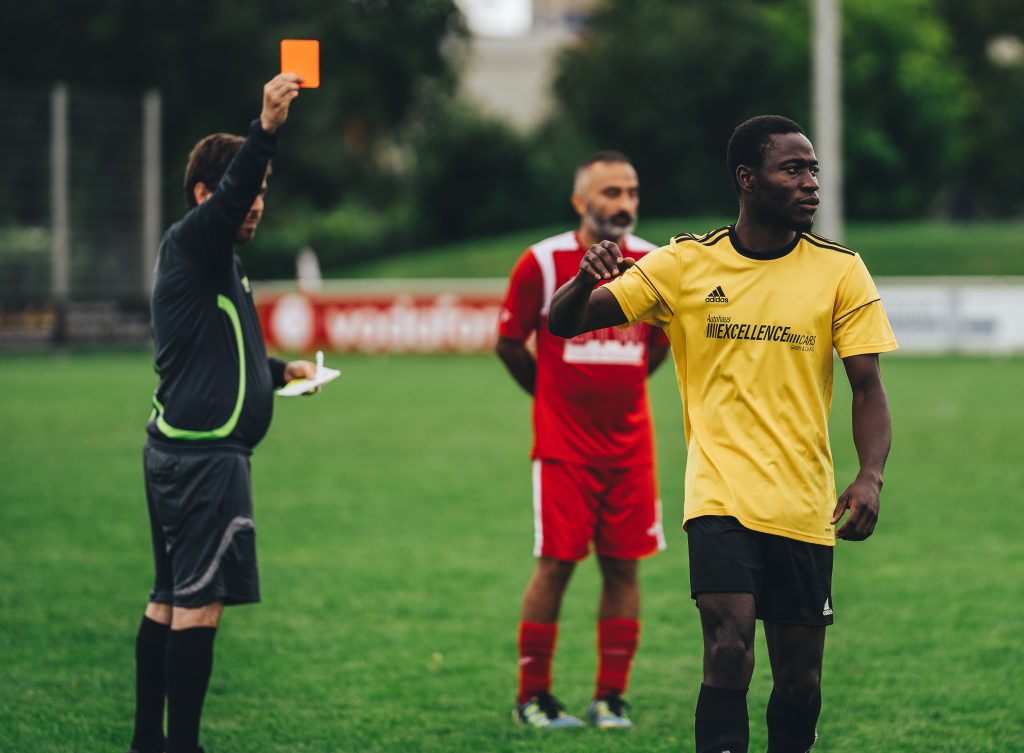
Communication and Teamwork
Pre-match Meetings with Assistant Referees
Prior to a match, it is essential to have thorough pre-match meetings with your assistant referees. Discuss your expectations, establish clear communication protocols, and review any specific situations or challenges you may encounter during the match.
This pre-match coordination will ensure that everyone is on the same page and working together as a cohesive team. It allows you to establish a strong working relationship with your assistant referees, which is crucial for making accurate decisions throughout the game.
Establishing Signals and Codes
Clear and effective communication between officials is vital on the soccer field. Establishing signals and codes with your assistant referees will help facilitate quick and precise communication during the match. Use standardized signals for offside, fouls, substitutions, and other key aspects of the game.
By ensuring that you and your assistant referees are using the same signals and codes, you can minimize confusion and make efficient decisions in real-time.
Coordinating with the Fourth Official
Coordinating with the fourth official throughout the match is important for seamless officiating. Communicate with the fourth official regarding substitutions, injuries, and any other relevant information.
The fourth official can assist in managing the technical aspects of the game, such as timekeeping and substitutions records. Establishing effective communication and coordination with the fourth official will contribute to the smooth running of the match and enhance your overall officiating performance.
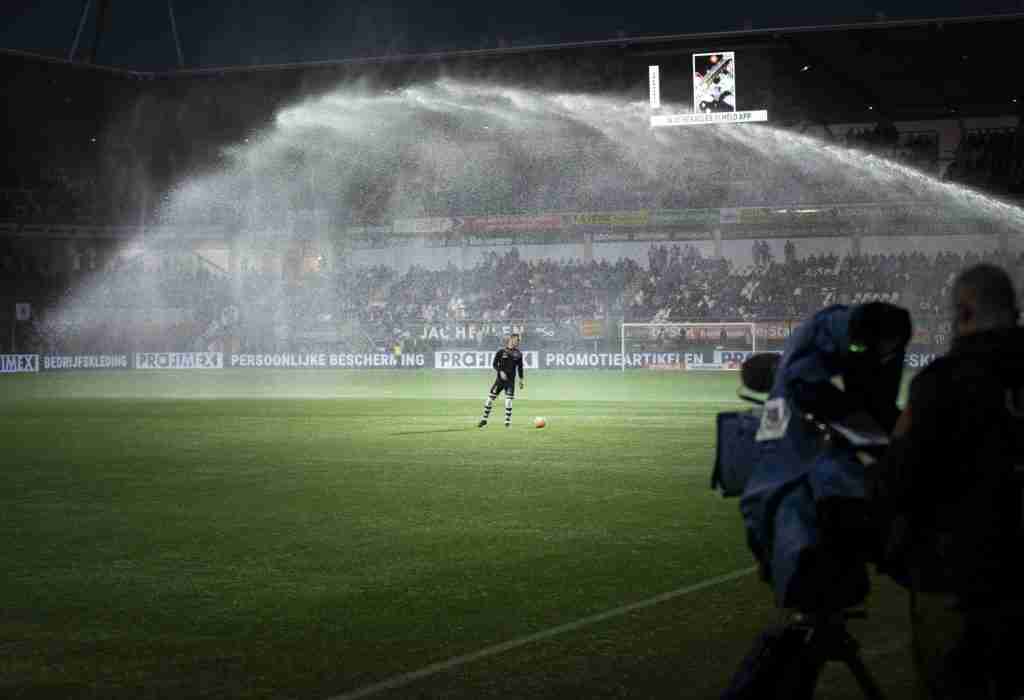
Equipment and Gear Check
Inspecting Jerseys and Uniforms
Before the match, it is crucial to inspect the jerseys and uniforms of both teams to ensure compliance with the regulations. Check for any unauthorized logos, incorrect numbering, or other violations that may affect their eligibility to play. Clear communication with the team captains and coaching staff regarding any jersey issues can prevent unnecessary interruptions during the match. By conducting a thorough inspection, you can maintain the standards set forth by the governing bodies and ensure fair competition.
Ensuring Proper Functioning of Whistle and Flags
The referee’s whistle and flags are essential tools for effective communication during a soccer match. Before the game, check that your whistle is in good working condition and produces a loud and clear sound.
Ensure that you have spare whistles or batteries if needed. Additionally, inspect the flags used by the assistant referees to verify they are in proper working order. Properly functioning equipment plays a crucial role in officiating the match and maintaining control and fairness on the field.
Testing Communication Equipment
Communication equipment, such as radios or wireless headsets, can greatly assist in efficient and effective communication among the match officials. Before the game, make sure that all communication equipment is in good working condition.
Test the range, clarity, and functionality of the devices to ensure seamless communication during the match. Reliable communication equipment can improve coordination and facilitate timely decision-making.
Pre-match Preparation

Arriving at the Stadium
Arriving at the stadium well in advance of the match allows you ample time to familiarize yourself with the facility and make any necessary preparations. Familiarize yourself with the layout of the stadium, including the location of the dressing rooms, the playing field, and any other relevant areas. This will help you navigate the stadium confidently during the match and avoid any last-minute confusion.
Stadium Inspection
Prior to the match, conduct a thorough inspection of the playing field and surrounding areas. Check for any potential hazards, such as uneven surfaces or debris, that may affect player safety or the flow of the game.
Ensure that the goal posts, nets, and pitch markings are in proper condition. By inspecting the stadium before the match, you can identify and rectify any issues that may impact the quality of the game.
Meeting with Team Captains and Coaches
Meeting with the team captains and coaches before the match allows you to establish a rapport and communicate your expectations for the game. Take this opportunity to remind them of the rules, emphasize fair play, and stress the importance of sportsmanship.
Address any concerns or questions they may have, ensuring that both teams are aware of your presence and ready for a fair competition. This pre-match discussion helps set the tone for the game and promotes a positive and respectful environment for all involved.
Warm-up Routine
Physical Warm-up Exercises
Just as players warm up before a match, referees should also engage in a warm-up routine to prepare their bodies for the physical demands of officiating. Incorporate exercises such as jogging, dynamic stretching, and light calisthenics into your warm-up routine. This will help increase blood flow, loosen up muscles and joints, and improve your overall mobility and flexibility. By warming up properly, you can reduce the risk of injuries and ensure that you are physically ready to perform at your best.
Mental Warm-up Techniques
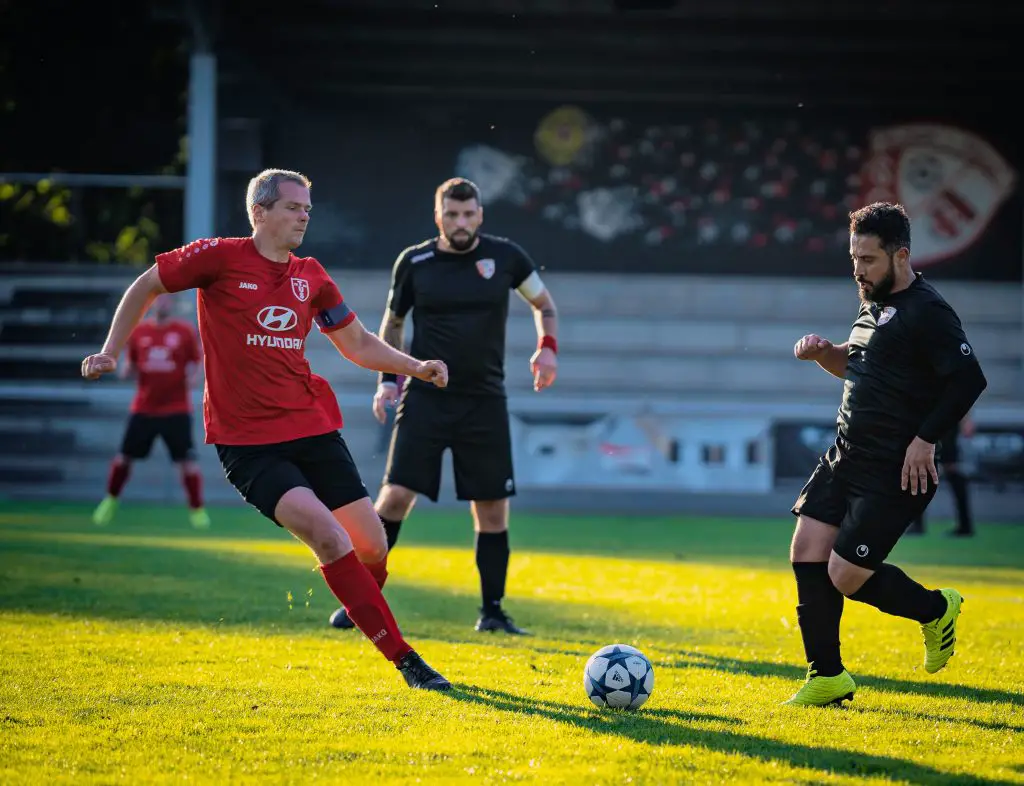
In addition to physical warm-up exercises, mental warm-up techniques are crucial for getting into the right mindset before a match. Engage in activities that help you relax and focus, such as deep breathing exercises, visualization, or listening to music. Clear your mind of any distractions or external pressures, and mentally prepare yourself to make accurate decisions and effectively enforce the rules. A strong mental state will contribute to your overall performance as a referee.
Pre-match Officials’ Meeting
Reviewing Match Assignments
Before the match, meet with your fellow officials to review the assignments for the game. Clarify who will handle specific duties such as timekeeping, substitution records, or sideline duties. Ensure that everyone is aware of their responsibilities and has a clear understanding of the tasks they need to fulfill. This pre-match meeting establishes a sense of teamwork and ensures smooth coordination among the officials.
Discussing Key Decisions and Scenarios
Use the pre-match officials’ meeting as an opportunity to discuss potential key decisions and scenarios that may arise during the match. Share different perspectives, exchange insights, and establish a cohesive understanding among the officiating team.
This pre-match discussion allows you to align your interpretations of the rules and protocols, minimizing any inconsistencies or confusion during the game.
Establishing Communication Protocols
During the pre-match officials’ meeting, it is essential to establish clear communication protocols among the officiating team. Determine the preferred method of communication during different situations, such as hand signals or verbal cues.
Agree on the terminology to be used for common scenarios, ensuring that all officials are on the same page. By establishing effective communication protocols, you can foster efficient teamwork and coordination, leading to better decision-making on the field.
Final Preparations
Wearing Proper Attire and Equipment
Before heading onto the field, ensure you are wearing the proper attire and equipment specified by the regulations. This typically includes a referee jersey, shorts, socks, appropriate footwear, and any necessary protective gear.
Double-check that your uniform is clean, well-fitted, and free from any unauthorized logos. Wearing proper attire and equipment not only ensures compliance with the rules but also helps you maintain a professional appearance on the field.
Double-checking Game Clock and Other Technical Requirements
As one of the officials responsible for timekeeping during the match, it is crucial to double-check the game clock and any other technical requirements related to timing, such as a stopwatch or additional timekeeping devices.
Make sure these devices are functioning properly and synchronized. Accurate timekeeping is essential for a fair and organized game, so paying attention to these technical details is crucial.
Performing Last-Minute Stretching
Before stepping onto the field, perform some last-minute stretching exercises to loosen up your muscles and improve your flexibility. Focus on areas that are prone to tightness or stiffness, such as the legs, hips, and back.
Stretching helps improve your range of motion and reduces the risk of injury during the match. Take a few moments to stretch and mentally prepare yourself for the game ahead.
Match Day Rituals and Superstitions

Following Personal Rituals
Many referees have their own personal rituals or routines they like to follow on match day. These rituals can vary from person to person but often involve activities that help them relax, focus, or mentally prepare for the game. Some referees may have a specific pre-match meal or listen to a certain playlist before stepping onto the field. The purpose of these rituals is to establish a sense of familiarity and routine, helping the referee feel more comfortable and confident before officiating the match.
Using Lucky Charms or Items
Similar to athletes, soccer referees may have lucky charms or items they carry with them on match day. These items can range from personal trinkets to small tokens of good luck. While the effectiveness of such superstitions is subjective, having a lucky charm can provide a psychological boost and help the referee feel more confident and focused.
Whether it’s a lucky coin in their pocket or a particular piece of jewelry, these items hold personal significance and can contribute to the referee’s mental conditioning.
Mental Conditioning Techniques
Mental conditioning techniques are vital for soccer referees, especially during high-pressure matches. Techniques such as mindfulness, positive self-talk, and visualization can help manage stress, maintain focus, and enhance decision-making abilities during the match.
Engage in activities that promote mental resilience and preparedness, whether it’s through meditation, self-affirmations, or engaging in relaxation exercises. By incorporating mental conditioning techniques into your pre-match routine, you can optimize your mental state and improve your overall performance as a referee.
Conclusion
In conclusion, the preparation of a soccer referee involves both physical and mental aspects. Endurance, speed, and strength training are crucial for physical fitness preparation, allowing referees to keep up with the pace of the game.
Mental preparedness includes studying the rules and regulations, reviewing match videos, and engaging in mental visualization exercises. Reviewing team and player information helps referees understand the tactics and dynamics of the game, while effective communication and teamwork with assistant referees and the fourth official are essential for successful officiating.
Equipment and gear checks, pre-match preparations, warm-up routines, and pre-match officials’ meetings contribute to a referee’s readiness for the match.
Finally, match day rituals and superstitions, as well as mental conditioning techniques, help referees develop a focused and confident mindset. By following these comprehensive preparations, soccer referees can ensure they are physically and mentally prepared to officiate matches effectively and impartially.

